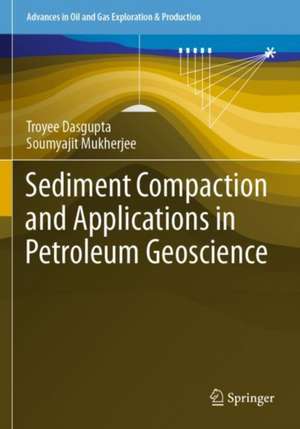Sediment Compaction and Applications in Petroleum Geoscience: Advances in Oil and Gas Exploration & Production
Autor Troyee Dasgupta, Soumyajit Mukherjeeen Limba Engleză Paperback – 14 aug 2020
| Toate formatele și edițiile | Preț | Express |
|---|---|---|
| Paperback (1) | 633.84 lei 6-8 săpt. | |
| Springer International Publishing – 14 aug 2020 | 633.84 lei 6-8 săpt. | |
| Hardback (1) | 891.17 lei 6-8 săpt. | |
| Springer International Publishing – 26 apr 2019 | 891.17 lei 6-8 săpt. |
Din seria Advances in Oil and Gas Exploration & Production
-
 Preț: 458.30 lei
Preț: 458.30 lei - 18%
 Preț: 1261.14 lei
Preț: 1261.14 lei -
 Preț: 465.21 lei
Preț: 465.21 lei - 19%
 Preț: 430.26 lei
Preț: 430.26 lei - 18%
 Preț: 972.62 lei
Preț: 972.62 lei - 18%
 Preț: 1013.02 lei
Preț: 1013.02 lei - 15%
 Preț: 701.25 lei
Preț: 701.25 lei - 18%
 Preț: 730.16 lei
Preț: 730.16 lei - 18%
 Preț: 1385.54 lei
Preț: 1385.54 lei - 20%
 Preț: 565.64 lei
Preț: 565.64 lei - 18%
 Preț: 996.78 lei
Preț: 996.78 lei -
 Preț: 378.34 lei
Preț: 378.34 lei - 15%
 Preț: 645.47 lei
Preț: 645.47 lei - 15%
 Preț: 583.45 lei
Preț: 583.45 lei - 18%
 Preț: 890.54 lei
Preț: 890.54 lei
Preț: 633.84 lei
Preț vechi: 745.70 lei
-15% Nou
Puncte Express: 951
Preț estimativ în valută:
121.28€ • 126.64$ • 100.15£
121.28€ • 126.64$ • 100.15£
Carte tipărită la comandă
Livrare economică 15-29 aprilie
Preluare comenzi: 021 569.72.76
Specificații
ISBN-13: 9783030134440
ISBN-10: 303013444X
Pagini: 99
Ilustrații: XXIII, 99 p. 87 illus., 46 illus. in color.
Dimensiuni: 178 x 254 mm
Greutate: 0.24 kg
Ediția:1st ed. 2020
Editura: Springer International Publishing
Colecția Springer
Seria Advances in Oil and Gas Exploration & Production
Locul publicării:Cham, Switzerland
ISBN-10: 303013444X
Pagini: 99
Ilustrații: XXIII, 99 p. 87 illus., 46 illus. in color.
Dimensiuni: 178 x 254 mm
Greutate: 0.24 kg
Ediția:1st ed. 2020
Editura: Springer International Publishing
Colecția Springer
Seria Advances in Oil and Gas Exploration & Production
Locul publicării:Cham, Switzerland
Cuprins
Porosity development in siliclastic rocks.-Porosity development in Carbonate rocks.- Compaction Trend definition and classification.- Well logs, Seismic and Geological data in porosity and compaction trend analyses.- Deviation of normal compaction trend in relation to pore pressure.- Global examples of overpressure scenarios.- Exhumation history analysis from sonic compaction trend.- Impact of compaction trend in different tectonic- and geological setting.- Application of Porosity and compaction trend in Petroleum geoscience.- Summary
Textul de pe ultima copertă
This book discusses how sediments compact with depth and and applications of the compaction trends. Porosity reduction in sediment conveniently indicates the degree of sediments compacted after deposition. Published empirical curves- the compaction curves- are depth-wise porosity variation through which change in pore spaces from sediment surface to deeper depths e.g. up to 6 km can be delineated. Porosity is derived from well logs. Compaction curves, referred as the Normal Porosity Profile of shales, sandstones and shale bearing sandstones of different models are reviewed along with the different mechanical and chemical compaction processes. These compaction models reveals how porosity reduces depth-wise and the probable reason for anomalous zones. Deviation from these normal compaction trends may indicate abnormal pressure scenarios: either over- or under pressure. We highlight global examples of abnormal pressure scenarios along with the different primary- and secondary mechanisms.Well logs and cores being the direct measurements of porosity, well log is the only cost-effective way to determine porosity of subsurface rocks. Certain well logs can detect overpressure and the preference of one log above the other help reduce the uncertainty. Apart from delineation of under-compacted zones by comparing the modeled- with the actual compaction, porosity data can also estimate erosion.
Caracteristici
Explains compaction trend models Shows the global distribution of overpressure zones in different tectonic regimes Enriches understanding of exhumation history analysis from Compaction Trend Provides complete instructions for log usage during Compaction Trend analysis
